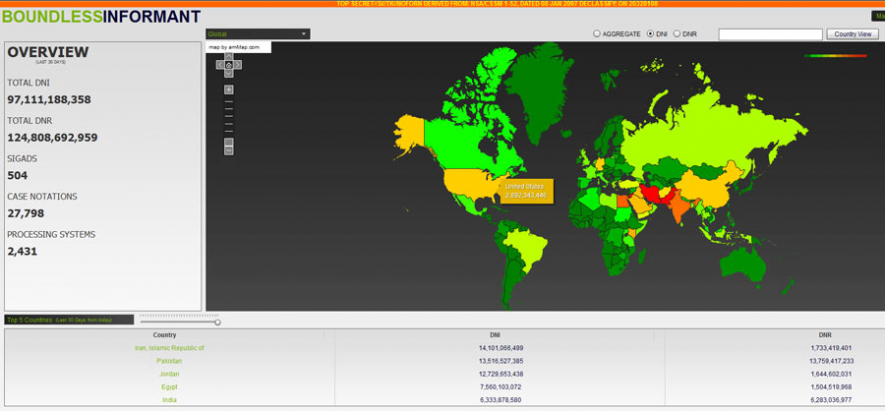U.S. Spied on Millions of e-mails and Calls of Brazilians
RIO - In the last decade, people residing in or transiting through Brazil, as well as companies operating in the country, have become targets of espionage carried out by the National Security Agency of the United States (the NSA).
There are no precise figures, but last January Brazil was just behind the United States, which had 2.3 billion phone calls and messages spied upon. This is shown by documents to which O GLOBO has had access. These documents were collected by Edward Joseph Snowden, who for the past four years worked in an NSA program, as one of about 54 000 employees of private companies subcontracted to the NSA by companies such as Booz Allen Hamilton and the Dell Corporation.

Last month, the American Edwards Snowden decided to denounce the surveillance operations conducted by NSA of communications inside and outside the United States. Snowden became responsible for one of the biggest leak of secrets in American history, which has severely affected the credibility of the Obama administration.
The NSA documents are eloquent. Brazil, which has extensive public and private networks,operated by large telecommunications companies, is highlighted on maps of the U.S. agency that appear to be focusing primarily on Brazilian voice traffic and data (origin and destination), along with data from nations such as China, Russia, Iran and Pakistan. It is uncertain how many people and companies have been spied on in Brazil - But there is evidence that the volume of data captured by the filtering system in the local telephone networks and the Internet is constant and large scale.
Founded 61 years ago, during the Cold War, the NSA is tasked with spying on communications from other countries and deciphering codes government. It is also dedicated to developing encryption systems for the government. The agency has undergone transformations since George W. Bush took office as President of the United States, especially after the terrorist attacks on New York and Washington in September 2001. The NSA has become a leader in Intelligence technology applied in radar and satellite data collection systems, in telecommunications, and in carrying out surveillance of public and private digital networks over the Internet.
The Obama administration has chosen to strengthen the NSA including by multiplying its budget, which continues however to be secret (as are the budgets of the 14 other U.S. spy agencies). Together, these agencies spent $ 75 billion last year, per the estimates of the Federation of American Scientists, a nongovernmental organization specializing in safety issues.
Per the leaked documents, the NSA has 35,200 employees. It is also reported that the agency maintains "strategic partnerships" to "support missions" with more than 80 of the "largest global corporations" (in the sectors of telecommunications, internet providers, network infrastructure, equipment, operating systems and applications, among others).
To facilitate global action, the agency has partnerships with major U.S. Internet companies. On the 6th of June, the newspaper "The Guardian" reported that the Prism software allows the NSA access to emails, chatting and voice calls from customers of companies like Facebook, Google, Microsoft, and YouTube.
However, this program does not allow the agency access to the entire universe of communications. Large volumes of traffic calls and Internet data occur outside the scope of the NSA and its partners in the use of Prism. To extend their reach, and build global espionage systems, the agency has developed other programs with corporate partners which are then able to provide the agencies with access to international communications.
One is Fairview, which enabled the collection of data in communications networks worldwide. It is used by the NSA, according to the description in the documents to which O GLOBO has access, in partnership with a major U.S. phone company. This company, in turn, maintains business relationships with other telecommunications services (in Brazil and worldwide). As a result of its relations with non-US companies, the U.S. operator has access to numerous local communications networks, including Brazilian.
Therefore, the NSA is able to access communications systems outside US borders using corporate alliances. The documents seen by O GLOBO describe the system as follows: "The partners operate in the U.S., but do not have access to information passing in networks of a nation, but under corporate relationships, provide exclusive access to the other [telecommunications companies and service providers internet]."
Telecommunications companies in Brazil have entered into such partnerships that give American companies access to Brazilian data. What is not clear is which company has been used by the NSA as this "bridge". It is also unclear whether the Brazilian companies are aware of how their partnerships with the relevant U.S. Company are being used.
Is it right that the NSA uses the Fairview program to directly access the Brazilian telecommunications system? It is this access that allows the US to collect detailed records of telephone calls and emails of millions of people, businesses and institutions.
To eavesdrop on communications of a resident or a firm established in the United States, the NSA need judicial authorization issued by a special court (the Foreign Intelligence Surveillance Court), composed of 11 judges who meet in secret.
It was this Court, for example, that authorized the agency to access phone records of almost 100 million users of Verizon, the largest telephone company in the country, for 90 days. There was an extension of the application to all American carriers - with permanent renewal.
Outside U.S. borders, the game is different. Monitoring people, companies and foreign institutions is NSA's mission, as defined in Presidential Order (number 12333) for three decades.
All kinds of information is stored on the Internet. Since 2008, for example, the government monitors with judicial authorization, browsing habits on the Internet within American territory. It has been successfully argued in court that the study of the online routine of “targets” would assist in domestic security. Thus, a person or company "of interest" resident in Brazil can be placed under constant surveillance. The agency holds all sorts of records (dialed number, trunk and extension used, duration, date, time, location, address of sender and recipient, as well as IP addresses - as well as websites visited). And does the same with whoever is on the other end of the line, or another computer screen.
Spying this level, and on a global scale, was only a suspicion until last month, when Snowden began to disseminate thousands of internal documents of the NSA. . This is the end of the era of privacy at any time and anywhere - especially in countries like Brazil.
Translated by Newsclick with the help of Google Translation
Disclaimer: The views expressed here are the author's personal views, and do not necessarily represent the views of Newsclick
Get the latest reports & analysis with people's perspective on Protests, movements & deep analytical videos, discussions of the current affairs in your Telegram app. Subscribe to NewsClick's Telegram channel & get Real-Time updates on stories, as they get published on our website.
























